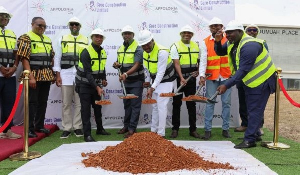The Okyeman Council, under the leadership of Osagyefo Amoatia Ofori Panin II, Okyehene, is working at establishing HIV/AIDS research centres in all major towns of the Akyem Abuakwa state to be used to gather and disseminate information on the disease to check its spread among the people.
Consequently, the Council has made available information kits on the disease to Akwatia, Tafo, Asiakwa, Asamankese, Kukurantumi, Kwabeng and Begoro, seven major towns in the state, and has also begun training counsellors to advise on the disease and become AIDS ambassadors in the state.
Osagyefo Ofori Panin announced the anti-AIDS measures when he launched an instant AIDS test kit and a book on the disease, "HIV/AIDS Knowledge Protect," sub-titled, "New and Specific Approaches to Contain the Spread of HIV in Developing Countries" in Kyebi on Friday, where Osagyefo Ofori Panin led the people to undergo free AIDS test.
The kit, called Instant Screen Rapid HIV-1/2 Assay, developed by the German-American Institute for Applied Biomedical Research (GAIFAR), takes only 30 seconds to perform a test and is capable of recognising all types of HIV, without requiring any additional material and special knowledge.
The test comes in different formats for doctors, offices and hospitals, mass screening in the field and for individual private testing. The 243-page book, which has 23 chapters, was written by Professors Heinrich Repke and Edward Ayensu, Chief Executive Officer of GAIFAR and President of the Pan African Union of Science and Technology respectively.
The book presents a comprehensive action plan for containing the spread of HIV/AIDS in developing countries and discusses essential tools for implementing and financing this strategy. Osagyefo Ofori Panin expressed his appreciation to Professors Repke and Ayensu and the GAIFAR team for bringing the test to the state and implored all Ghanaians to be confident and go for an AIDS test to know their status and review their conditions every six months.
He said this would enable Ghanaians to contribute effectively to AIDS discussions and avoid its scare. Osagyefo Ofori Panin said, going for the test in Okyeman did not mean Okyeman had a high prevalence rate of the disease, but rather would help people change wrong perceptions about the disease for more responsible living.
He attributed the high prevalence of the disease in Africa mostly to poverty and asked people to disabuse their minds of the conception that AIDS is a disease of witchcraft. He called for a massive crusade to save women and children from dying from the disease, saying, "everything we are doing today is for our children and if we sit down and let them die, we will not have any future."
The Okyehene appealed to individuals, philanthropic and non-governmental organisations for a mobile testing unit to enable the ambassadors to move from place to reach the people with educational programmes and other services in the communities. Osagyefo Ofori Panin expressed the hope that the book would be translated into local languages for people to read and adopt a more proactive approach to the eradication of the disease.
Both Professor Repke praised the Okyehene for his leading role in the control of the disease in the Akyem state, and described him as the first major traditional leader in Africa to lead such a crusade. Comparing Ghana to Botswana, Prof Repke recalled that Botswana, a country in East Africa HIV/AIDS prevalence rate 2 per cent soared to 35 per cent within 10 and called for drastic measures to control the disease. He advocated screening and testing as a major control measure and said one's status would be kept confidential.
Mr Emmanuel Victor Asihene, District Chief Executive for East Akyem, said the one per cent of the District Assembly Common Fund, making only 20 million cedis has been allocated to anti-AIDS activities, was very scanty to meet the needs of the 266 communities within the districts and appealed to public spirited individuals and organisations to come to the aid of the district in the fight against the disease.
General News of Saturday, 4 May 2002
Source: gna












